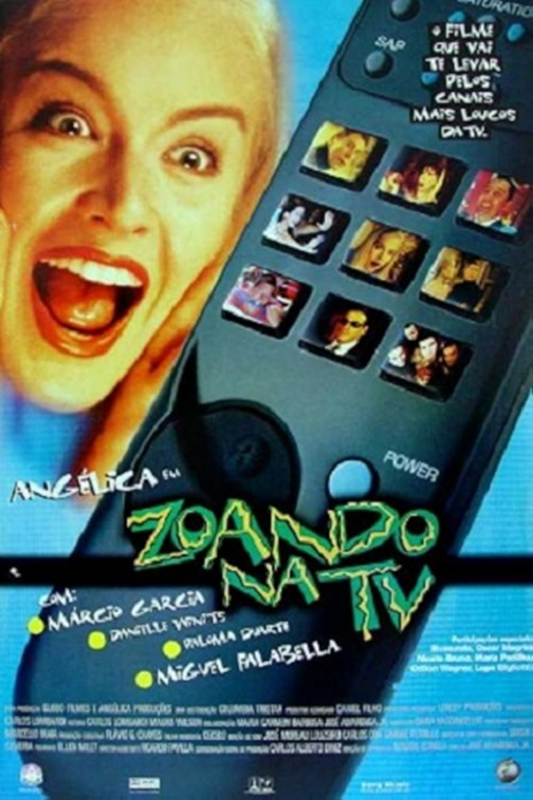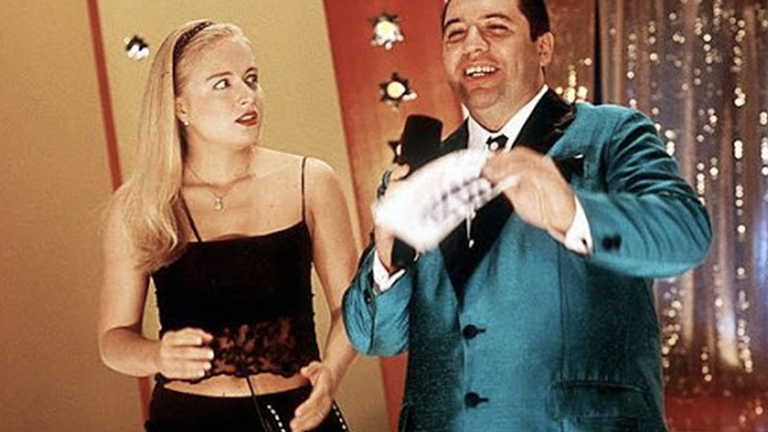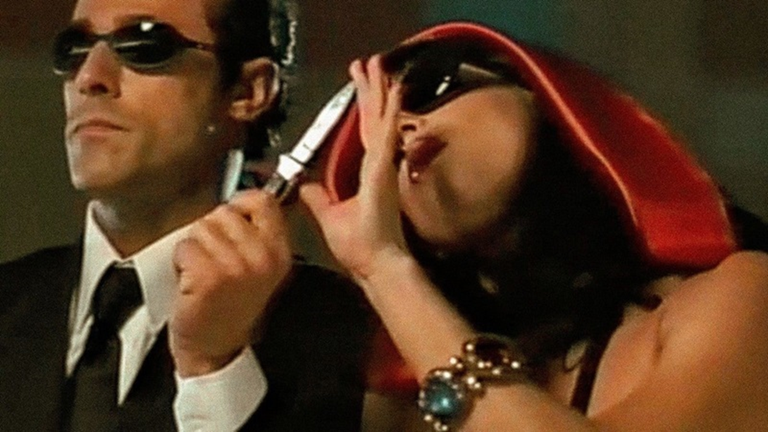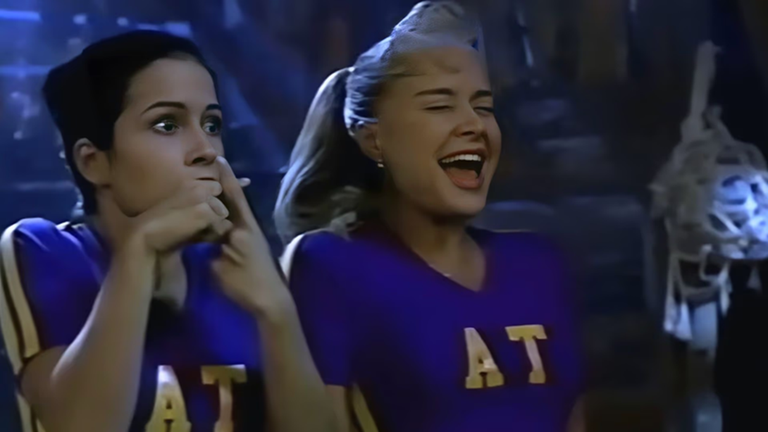 IMDb
IMDb[PT-BR]
Sinopse: Angel é uma mulher trabalhadora, e muito sonhadora. Noiva do atrapalhado Ulisses, ela se encontra em uma aventura completamente inesperada depois que o seu noivo é misteriosamente “engolido” pelo tubo de imagem da televisão da casa deles. Agora, para conseguir se casar, ela precisa primeiro resgatar o seu amado.
Literalmente, você alguma vez já se imaginou como seria viver dentro de uma televisão? Essa é basicamente à premissa desta comédia brasileira, que funciona muito bem se baseando em uma ideia completamente estapafúrdia para criar uma espécie de “mundo alternativo” conectando o mundo real com o mundo surreal da televisão. Sendo desprovida de qualquer sendo com à realidade, o filme consegue se tornar funcional por apostar em uma abordagem diferenciada, repleta de boas piadas (embora também hajam as piadas ruins ou politicamente incorretas) e com um elenco divertido.
 Notícias da TV - UOL
Notícias da TV - UOLAngel ganha à vida trabalhando em uma loja de noivas, e o seu sonho é casar com seu noivo, Ulisses. Enquanto ela se esforça para juntar dinheiro para fazer a festa de acontecer, o noivo se esforça em gastar o dinheiro dele com besteiras que apenas atrasam esse acontecimento tão esperado pela noiva. Certo dia, ele compra uma televisão moderna, mas não sabe o tamanho da confusão na qual ele está se metendo depois que ele encontra um anel mágico jogado no chão de um shopping. Na busca pelo anel está a sensual vilã, Lana Love, que fará de tudo para escapar e viver o mundo real.
O único modo de sair de dentro da televisão é através do anel mágico, e para isso, Lana Love acaba seduzindo Ulisses e faz com ele seja “sugado” para o mundo televisivo. Depois de ver o noivo dentro da televisão, Angel também decide “mergulhar” naquele mundo, mas para salvá-lo ela precisará viver uma grande aventura pelo fantástico universo onde o normal é não ser normal. O roteiro tem um argumento ótimo, e que apesar de ser algo totalmente caótico em termos narrativos, é extremamente divertido pela proposta que acaba entregando ao público. Simples e puro entretenimento.
 AdoroCinema
AdoroCinemaUma das coisas que eu mais gosto neste filme é o fato dele nunca se levar a sério. O projeto realmente abraça todo o seu lado nonsense sem o menor pudor, apostando em piadas de todos os níveis possíveis (aliás, algumas delas seriam muito mal vistas pelos integrantes da sociedade nessa fase atual) e trazendo ótimos resultados. Mesmo que nem todas as piadas funcionem por completo, o esforço em criar um filme diferente e engraçado é facilmente visto. Eu enxergo o esforço como algo extremamente válido, principalmente quando se trata de filmes brasileiros (em especial, comédias).
Migrando entre os mais diferentes (e bizarros, no melhor sentido que essa palavra pode ter) tipos de cenários, o filme consegue fazer o público ser “teletransportado” direto para dentro do funcionamento de uma programação televisiva. Novelas, programas culinários, programas de auditório, filmes, documentários, além de comerciais de patrocinadores são alguns exemplos do que é mostrado, e em cada um desses cenários os personagens vão se encontrando e criando as pontes necessárias para manter a trama funcionando. Além disso, há também um foco nos bastidores da televisão.
 Pinterest
PinterestNo elenco, nomes como Angélica, Márcio Garcia, Danielle Winits, Paloma Duarte e Miguel Falabella. Ninguém entrega uma performance admirável, mas em se tratando de uma comédia onde o que menos importa é uma boa atuação, os atores e atrizes aqui acabam atuando melhor do que o esperado. Tudo é tão propositalmente inverossímil, que acaba se tornando um projeto muito bem executado por conseguir fazer o público acreditar no que está sendo construído, e isso é um mérito coletivo, porque tanto o elenco, quanto os roteiristas e o diretor trabalharam bem para isso acontecer.
Falando em direção, José Alvarenga Jr. (que também ajudou a escrever o roteiro) entrega um trabalho competente. O filme não é algo memorável, mas merece o devido reconhecimento pela ousadia de ter criado algo “fora da caixa” em tempos tão genéricos. Tecnicamente o filme também merece um destaque, porque mesmo não sendo um filme caro, ele é totalmente funcional pela sua representação visual, que é dinâmica e repletas de boas transições, apostando em cenários fiéis aos de uma programação televisiva, transitando entre diferentes gêneros que são assistidos diariamente.
 Plex
PlexZoando na TV é um exemplo bem interessante de como fazer comédia dentro do próprio universo ao qual ele pertence. Essa é uma característica que poucos filmes de comédias brasileiros conseguem ter, e mesmo tendo uma abordagem totalmente cartunesca, o roteiro é perspicaz tanto entretenimento que ele oferece, quanto na sua originalidade sobre a construção do projeto. Mergulhar dentro de uma televisão nunca foi tão divertido, e este filme realmente consegue fazer isso de uma maneira muito cativante, quase como uma “autocrítica” sobre os tão famosos bastidores televisivos.

Synopsis: Angel is a hard-working woman, and very dreamy. Engaged to the clumsy Ulysses, she finds herself in a completely unexpected adventure after her fiance is mysteriously “swallowed” by the television picture tube in their home. Now, in order to get married, she must first rescue her lover.
Literally, have you ever imagined what it would be like to live inside a television? That's basically the premise of this Brazilian comedy, which works very well based on a completely absurd idea to create a kind of “alternative world” connecting the real world with the surreal world of television. Being devoid of anything related to reality, the movie manages to become functional by focusing on a different approach, full of good jokes (although there are also bad or politically incorrect jokes) and with a fun cast.
Angel makes a living working in a bridal shop, and her dream is to marry her fiancé, Ulisses. While she struggles to save money to make the party happen, the groom struggles to spend his money on nonsense that only delays this event so awaited by the bride. One day, he buys a modern television, but doesn't know how much trouble he's getting into after he finds a magic ring thrown on the floor of a shopping mall. In search of the ring is the sensual villain, Lana Love, who will do anything to escape and live in the real world.
The only way to get out of the television is through the magic ring, and to do so, Lana Love ends up seducing Ulisses and getting him “sucked” into the television world. After seeing her fiancé on television, Angel also decides to “immerse herself” in that world, but to save him she will need to live a great adventure through the fantastic universe where normal is not being normal. The script has a great argument, and despite being completely chaotic in narrative terms, it is extremely entertaining due to the proposal it ends up delivering to the audience. Simple and pure entertainment.
One of the things I like most about this movie is the fact that it never takes itself seriously. The project really embraces all of its nonsense side without the slightest shame, betting on jokes of all possible levels (in fact, some of them would be very frowned upon by members of society at this current stage) and bringing great results. Even though not all of the jokes work completely, the effort to create a different and funny movie is easily seen. I see the effort as something extremely worthwhile, especially when it comes to Brazilian movies (especially comedies).
Migrating between the most different (and bizarre, in the best sense of the word) types of scenarios, the movie manages to make the audience “teleported” directly into the workings of television programming. Soap operas, culinary programs, talk shows, movies, documentaries, as well as sponsor commercials are some examples of what is shown, and in each of these scenarios the characters meet and create the necessary bridges to keep the plot working. In addition, there is also a focus on behind-the-scenes television.
The cast includes names like Angélica, Márcio Garcia, Danielle Winits, Paloma Duarte and Miguel Falabella. Nobody delivers an admirable performance, but in the case of a comedy where what matters least is good acting, the actors and actresses here end up acting better than expected. Everything is so purposefully implausible, that it ends up becoming a very well executed project because it manages to make the public believe in what is being built, and this is a collective merit, because both the cast, the scriptwriters and the director worked well to make this happen.
Speaking of direction, José Alvarenga Jr. (who also helped write the script) delivers competent work. The movie is not memorable, but it deserves due recognition for the boldness of having created something “outside the box” in such generic times. Technically, the movie also deserves a highlight, because even though it is not an expensive movie, it is fully functional due to its visual representation, which is dynamic and full of good transitions, betting on scenarios faithful to those of television programming, moving between different genres that are watched daily.
Zoando na TV is a very interesting example of how to create comedy within the universe to which it belongs. This is a characteristic that few Brazilian comedy movies manage to have, and even though it has a completely cartoonish approach, the script is insightful in terms of both the entertainment it offers and its originality in the construction of the project. Diving inside a television has never been so fun, and this movie really manages to do that in a very captivating way, almost like a “self-criticism” about the famous television behind-the-scenes.

Posted Using InLeo Alpha
